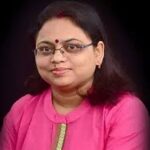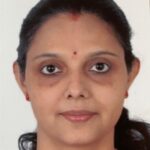Special Sessions
IEEE SPace, Aerospace and defenCE Conference, 2025 (SPACE 2025)
Women in SPACE

PD, VOM, ISRO

PD, SAMOOHA, ISRO

Former Director CMSDS & Chair, AESS Hyderabad Chapter

PD HEP , ISRO
Abstract
Date: July 23, 2025Time: 8:30-10:30 AM
Venue: Poinsettia 2
1. Challenges and accomplishments of interplanetary missions : Moon to Mars & Role of Women Scientists : Dr. Ritu Karidhal, PD, VOM, ISRO
Abstract: Working for Mars Orbiter Mission is the most prestigious and challenging one as it was totally a new kind of mission for ISRO from conceptualization till Mars Orbiter Insertion. Implementing full scale onboard autonomy for an interplanetary mission and making it capable of having self-diagnostics and self-recovery was one of the toughest tasks . Similarily ensuring the soft and safe landing on Moon surface is highly challenging and complex task , for ex study of huge amount of image data for landing site selection , performing various tests etc. Women Scientists of ISRO have contributed immensely towards achieving the success of these challenging missions. "
2. Semiconductors: Fuelling next generation Systems
Advanced semiconductor technologies play pivotal role in development of robust and efficient SWAPc systems like next generation RADARS, electronic warfare systems, drones, sensors and satellites. Being strategic, these technologies are often restricted or denied. SSPL along with GAETEC and STARC as production partners has been spear heading the development of indigenous technologies and their limited production for strategic applications of DRDO and ISRO.
India has developed and demonstrated semiconductor material and device process technologies for high frequency, high power devices and GaN MMIC for microwave communications, semiconductor lasers, MEMS-based sensors, Acoustic sensors, SAW based sensors and IR imaging devices. A lot of work is happening in quantum technology for sensing , THz technology, High efficiency Solar cells and SiC power devices for green energy and space applications. Other areas of interest are 6G and IoT technologies using GaN device technology, InP HEMTs and photonic IC technology.
As the global industry advances toward becoming a trillion-dollar market by 2030, Semiconductors plays a pivotal role in making India technologically self-reliant (Atmanirbhar). The talk will also touch upon emerging global technology trends, their implications for defense and commercial markets. These innovations not only strengthen national defense but also contribute to the country’s economic and technological growth making the Viksit Bharat 2047 dream alive.
Satellite formation flying is the coordinated movement and positioning of multiple spacecraft, flying in close proximity to each other, to achieve a common mission objective. This technique allows for enhanced capabilities compared to using a single large satellite, offering benefits like increased redundancy, higher resolution data and the ability to observe targets from multiple angles. It can also be more cost-effective to launch and operate a constellation of smaller, simpler satellites than one large complex one. While offering several advantages, there are also a few disadvantages including increased complexity in orbital control and potential for collision due to space debris. This talk will touch upon the concept, advantages and disadvantages of formation flying satellites with a few examples.

PD, VOM, ISRO

PD, SAMOOHA, ISRO
- Satellite configuration
- Mission planning, analysis & operations
- Autonomy and automation of satellite operations
- Dynamic Satellite Software Simulator – design & development for national and international customers.
- Project Director, SAMOOHA Satellites Constellation, first of its kind at ISRO
- Associate Project Director for Communication and Navigation Satellites: CMS-01and NVS-01(next generation satellites series for NavIC)
- Co-Study Director for the cutting-edge technological Opto-Quantum Communication Program
- Operations Director for GSAT-12, GSAT-18 & South Asia Satellite (first ISRO satellite with Electric Propulsion system)
- Project Manager for the heaviest and highest power handling ISRO S/C – GSAT-11
Contact info : anu.sprakash@gmail.com, spanu@ursc.gov.in • Mob : 09741019314, 09980405220

Former Director CMSDS & Chair, AESS Hyderabad Chapter
Madhumita Chakravarti completed her B Tech and M Tech degree from Instt. Radio Physics and Electronics, Calcutta University and PhD from IIT Hyderabad. She designed and developed programmable and re-configurable Airborne RF Sensors for various Air defence and Area Defence Missile programs of DRDO. She has developed multi-function RF Chips for indigenous development of sensors. The system designed by her has been inducted to Indian Air Force and Indian Army. She served as the Director of Centre for Millimeterwave Semiconductor Devices and Systems (CMSDS), a DRDO lab in Kolkata, where high-power mmW semiconductor source could be fabricated for the first time in India. After retirement from DRDO she joined NSpace Tech India Pvt Ltd as Head R&D.
She is recipient of Path Breaking Technology Award of DRDO in 2010 and in 2017. She received felicitation from State of Andhra Pradesh and Telangana for developing MSMEs in 2015. She has received INAE Woman Engineer of the Year Award 2021 and WAMS women professional excellence award 2022. On the occasion of 75th year of independence her name appeared in 75 notable women engineers of India.
Apart from this, she has served as secretary for IEEE Hyderabad Section in 2015-16. She is founder Chair of IEEE MTT/AP/EMC Chapter, ad-com member of MTT-s in 2009, founder member of WIE affinity group and founder Chair of AESS Chapter in IEEE Hyderabad Section.

PD HEP , ISRO
Dr. Manju S. Nair is the Project Director for the ambitious High thrust Electric Propulsion system project of LPSC,ISRO and responsible for ISRO’s first ever 5 kW indigenous Electric Propulsion system which is to be flight tested soon. She also heads the Electronics Systems Group of LPSC leading the activities of electronic packages for various launch vehicle and satellite missions of ISRO including prestigious Chandrayaan and Gaganyaan missions.
She has received the award for team excellence in the field of Electric propulsion. She has also published many technical papers in international journals and holds a patent for her work in high power converters. Outside of her professional career, she is a TEDx speaker and a speaker at the Soorya Women Talk Festival. She is also a student of Bharatnatyam and a passionate yoga practitioner.